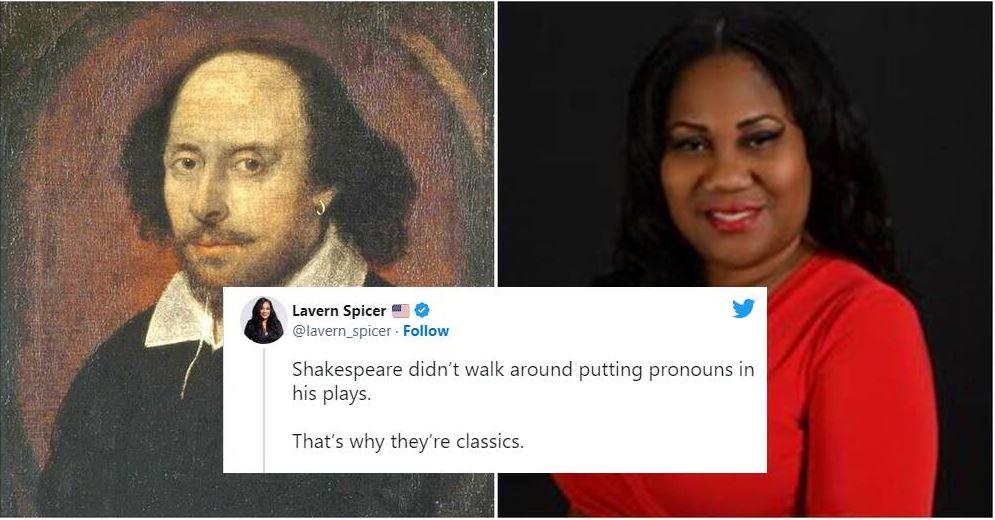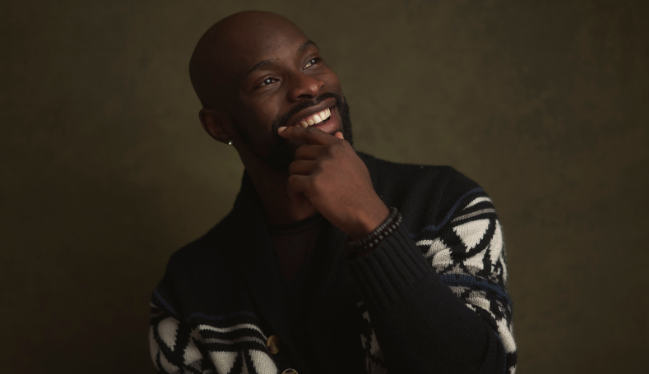In William Shakespeare’s “Sonnet 59,” he makes the point that there is “nothing new but that which hath been before.” Here, he admits that even the Bard himself struggled to come up with new ideas that hadn’t been written about previously.
This problem stems from the fact that people tend to think the struggles we have today are entirely new when they’ve been part of the human drama for centuries. A great example is how society grapples with gender nonconformity. In 2023, there is a vigorous debate, which tends to fall along political party lines, over the use of personal pronouns.
Lavern Spicer, a Republican from Florida who has lost two congressional elections, has made a point of fighting back against the use of pronouns. She’s gone viral for incorrectly claiming that pronouns weren’t used in either the Bible or the Constitution.
Spicer was back at it again on January 1 when she tweeted, “Shakespeare didn’t walk around putting pronouns in his plays. That’s why they’re classics. Imagine if this dude wrote ‘My name is Macbeth and my pronouns are they/them.’ SMH.”
Shakespeare didn’t walk around putting pronouns in his plays.
That’s why they’re classics.
Imagine if this dude wrote “My name is Macbeth and my pronouns are they/them”.
SMH.
— Lavern Spicer ?? (@lavern_spicer) January 1, 2023
The former congressional candidate received countless responses from people explaining that Shakespeare used pronouns in his writing and gender-neutral ones at that. Further, many of Shakespeare’s plays featured themes of gender nonconformity.
Spicer’s tweet showed that she probably hadn’t read much Shakespeare.
So you’ve never read Shakespeare, then.
— Darrin Bell (@DarrinBellArt) January 2, 2023
Sweetie, crossdressing and gender confusion are MAJOR PLOT POINTS in *several* of Shakespeare’s plays. Just say you’ve never read any of his work next time, it’ll be more honest.
— Suzy (endless screaming) (@mis_cue) January 16, 2023
Shakespeare’s plays regularly commented on sex, gender identity/fluidity and expression. One of the best parts of Shakespeare is how often productions choose to explore these concepts. This is a very silly tweet.
— Sam (@SamHunt999) January 17, 2023
Twitter user Jason Tondro explained that Shakespeare used the singular “they” “before it became the target of a cultural war.”
Shakespeare took great delight in confusing the audience about gender, and I’m gonna give you just two examples because I’m waiting for take-out. 1/3 pic.twitter.com/NaWaWPSQaD
— Jason Tondro (@doctorcomics) January 17, 2023
The famous best example is Twelfth Night, in which a male actor dresses up as Viola, a young woman who dresses up as a young man who falls in love with another man and who is loved by another woman (who is played by a man). 2/3
— Jason Tondro (@doctorcomics) January 17, 2023
But my personal favorite is Othello, when Desdemona’s maid explains women behave badly because they learned all that shit from men, and then you remember both women are being played by men, so the whole scene is really men holding up a mirror and saying “take a long ass look”.3/3
— Jason Tondro (@doctorcomics) January 17, 2023
Shakespeare used the singular “they” centuries before it became the target of a cultural war, and it’s funny the OP should cite Macbeth because that’s where Shakespeare wrote “Unsex me here” ffs (take out is late). /4
— Jason Tondro (@doctorcomics) January 17, 2023
Cross-dressing was also a regular part of all of Shakespeare’s plays because, during his time, women weren’t allowed to be actresses so female roles were played by young men or boys.
— Cheryl (@cheeryohs) January 14, 2023
Ma'am...Twelfth Night's ENTIRE PLOT involves a woman (who would have been played by a male actor) dressing as a man. A performance of that play is where this very famous picture comes from, with Anne Hathaway playing the role of the play's protagonist, Viola. pic.twitter.com/fVhpbc3wsB
— Rowan The Fox (@SexyBurlapSack) January 17, 2023
Twelfth Night, in which a male actor dresses up as Viola, a young woman who dresses up as a young man who falls in love with another man and who is loved by another woman (who is played by a man).
— David Williamson #FBPE #FBPPR #AutismParent (@Ourtosh) January 17, 2023
It was also funny that of all of Shakespeare’s plays she chose to make an example out of “Macbeth.”
Macbeth literally opens with Macbeth asking the witches their pronouns pic.twitter.com/Hc9cutlWKb
— Doug Dodson (@DougDodsonENews) January 18, 2023
Oh Lavern, you never fail to amuse me. Do you know what "DRAG" stands for? Shakespeare's stage direction: DRessed As Girl. All productions had male actors, including those playing the female parts. Yes, Lady Macbeth was a dude. I doubt if you've ever read a word by the Bard.
— StarryKnight (@tpkirb) January 17, 2023
Looking back at Shakespeare’s work proves that pronoun use has evolved and will continue to do so.
Ironically, Shakespeare is a perfect example of how pronoun usage changes with the times. We don’t use thou, thine, or thy anymore but he did. The culture changed and thrived. It can do so again.
— Kate Lonsdale (@KateWritesStuff) January 17, 2023
Spicer fired back at her critics using the most inclusive of all nongendered pronouns, “Y’all.”
Y'all triggered.
— Lavern Spicer ?? (@lavern_spicer) January 17, 2023
To be charitable to Spicer, it seems she tried to make the point that things were better in the past because we had defined gender roles. But she used an awful example to make her point. Further, her point is wildly incorrect because gender nonconformity has been part of humanity since the beginning of time.
Shakespeare’s work isn’t timeless because of his pronoun use, but because his work touched on universal human themes that have remained relevant for hundreds of years. Shakespeare wrote about love, family, power, death, ambition, fate and yes, gender.






































